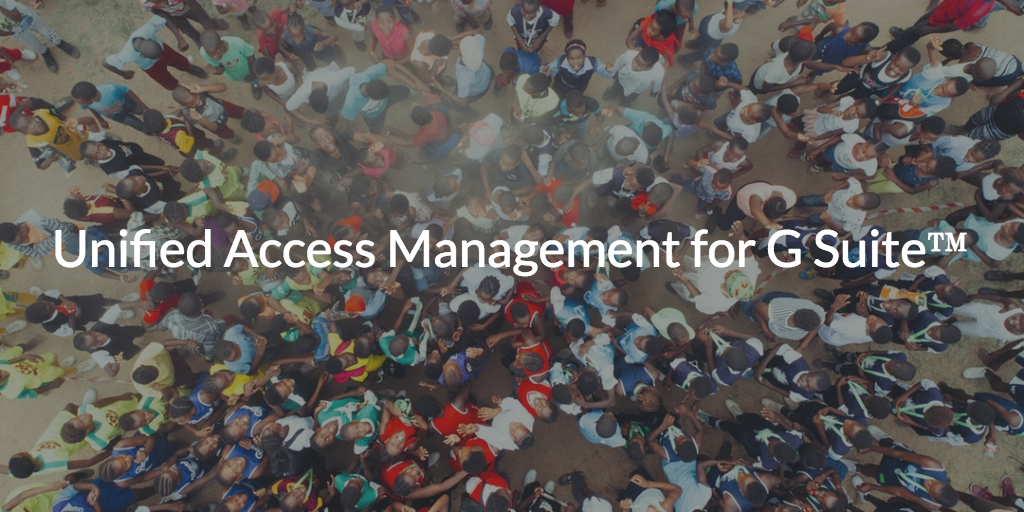As IT organizations have been grappling with a rapidly changing landscape, we see a wide variety of approaches to identity management within an organization.
One of the most common approaches is to address whatever the most acute problem is with the most immediate tool at hand.

Unfortunately, that approach can often back IT organizations into a corner when it comes to identity and access management (IAM). That’s why IT should always start with the identity provider when strategizing how to centralize identity management in a modern IT environment.
Let’s take a look at some of the identity management categories IT admins are employing to solve some of their most acute problems. In doing so, the reasons why IT should always start with the identity provider will be revealed.
Solving IAM Problems with Web App SSO and MFA
Web applications can be one of the most glaring identity management issues for cloud forward organizations. Companies tend to use 50+ web-based applications. So, it is easy to see why the issue of enabling end users to quickly and easily access applications can be top of mind. Web application single sign-on (SSO) is one of the most common solutions IT admins utilize to provide users with easy access to this abundant resource.
In addition to web applications, multi-factor authentication (MFA) is an identity management category IT admins employ to solve a specific problem. In this day and age, a user’s credentials are the keys to a company’s digital kingdom, so securing user identities with and MFA IdP has never been more important. MFA (also known as 2FA) is one of the most powerful mechanisms to thwart security breaches related to compromised identities.
These are just two examples of some of the IAM problems IT organizations are facing and a couple of the methods IT organizations are employing to address them. Web app SSO, MFA, and many other identity management sub-categories are incredibly valuable. In fact, these solutions should be in virtually every organization. Problems arise though when IT admins focus their problem solving on just these aspects of identity management.

An IAM Strategy Needs More
While specific problems may be resolved by purchasing a web application SSO tool or MFA solution, the overarching IAM strategy can be left disjointed. This is because, more often than not, web applications and identity security are just some of the problems IT is experiencing. For example, many companies also have to contend with cloud servers, non-Windows systems, and a new variety of file storage solutions. Identity security is also more critical than ever and requires a foundational approach.
How will a web app SSO platform connect to AWS® cloud servers, or manage Mac®, Linux®, or Windows® system access? How will a MFA solution support user access to file storage solutions like Box and NAS appliances? Obviously, it’s not possible to solve these user access problems with just SSO or MFA.
IT organizations end up solving these new problems, like access to Mac systems, with point solutions. These individual, tactical solutions end up creating silos of identities without a central, authoritative source of identity across the organization. This approach ultimately increases security risks, creates significant extra work and cost, and decreases productivity for end users.
This is why IT should always start with the core identity provider when it comes to addressing identity management challenges.

Benefits of Starting with the Identity Provider
Taking an identity management approach that starts with the identity provider solves a number of critical issues.
Creates a Single Source of Truth
First, there is always a central, authoritative source of truth for a user’s identity across the entire enterprise. There aren’t multiple directories or identities that end users and IT admins are managing; there’s just One Identity to Rule Them All®.
Centralizes Identity Security
Second, IT admins can enforce strong security standards at the core, such as password complexity settings, MFA, and SSH keys. This allows for one central security policy that can be enforced across the whole organization, instead of having to create separate security standards for each identity silo.
Optimizes User Management
Third, with a modern cloud identity provider, IT admins can build in the process to control access to virtually all IT resources, enabling more than just one category like web applications. An end user may need to access servers, their various systems, on-prem applications, data in the cloud or on-prem, and of course, the network itself. An IT environment can be managed a lot more efficiently when all of those IT resources are controlled in one place. Also, security is strengthened because each employee has unique access to those resources. For example, with the right solution each user can have access to WiFi with their own username and password, instead of a shared passphrase. This makes it much easier to ensure only the right people are accessing the network.
Ensures IT Resources Can Talk to Each Other
When IT organizations solve their challenges by rethinking the identity provider at the core of the network, they can build an overarching strategy around identity management that’s suitable for the specific needs of their environment. The right core IdP solution can integrate with virtually all of the other IAM categories, eliminating the risk of finding various solutions that don’t talk to each other. With this approach, you can be sure that just about all of the identity management solutions will communicate with a directory service.
Start with the Identity Provider to Centralize a Modern IT Environment
As organizations deal with the complexity of the modern IT landscape, identity management is no doubt near the top of the list of issues to solve. The best strategy starts with reevaluating the identity provider at the core and refining your strategy from there. You’ll be happy you started with a solid, stable foundation.
If we can answer any more questions about why IT should always start with the identity provider to address challenges, drop us a note. If you’re curious about how an identity provider that centralizes access to all of your IT resources works, sign up for a free account. You’ll be able to explore all of our features, and your first ten users are free forever.
